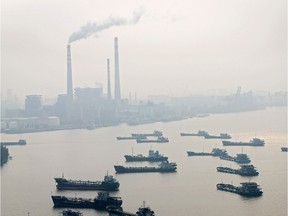Greg D’Avignon and Jacob Irving: B.C. has an advantage in a carbon-constrained world
British Columbia’s major commodity exports have around half the GHG intensity of identical goods produced in other jurisdictions

Article content
World leaders will be in Vancouver this week for the Clean Energy Ministerial hosted by Natural Resources Canada. What they will hear from businesses is that B.C. can attract investment and foster economic growth while helping to lessen global climate impacts — all thanks to the province’s low-carbon advantage.
Climate change is a global problem and green house gases know no borders. Reducing emissions is a formidable challenge with growing populations and economies — driven by emerging markets and their expanding middle classes. Energy, food and other raw materials are required to support this growth. To address climate change, tomorrow’s energy and commodities must be less carbon intensive.
Imagine if all 4.9 million B.C. residents simply vanished and provincial emissions completely ceased. We would eliminate roughly 62 million tonnes of GHG’s from the global total, approximately 0.002 per cent. B.C. would still experience climate change, while global emissions would be reduced by the equivalent of two days worth of China’s current GHGs.
B.C. can make a meaningful difference by becoming a low-carbon supplier of choice for energy, other commodities and technology. To do so, B.C. must be competitive with the regulations, infrastructure, and fiscal tools in place to stimulate new investment and leverage this low carbon opportunity.
Recent research finds that on average, British Columbia’s major commodity exports have around half the GHG intensity of identical goods produced in other jurisdictions. This reflects a few things.
First, B.C. has some of the highest regulatory standards, operating practices and applied technology solutions in the world for the production of energy and other commodities. Second, we are close to many of the fastest-growing markets for our traded goods, thus reducing shipping emissions. Finally, B.C. ranks globally near the top in renewable electricity with around 95 per cent clean power.
These combined strengths add up to a low carbon advantage. If B.C. can export more energy and other natural resources to help build the world’s electric vehicles, wind turbines, and other lower carbon products, global emissions would be lower than if the same inputs are sourced from other global suppliers.
Consider some examples. Rio Tinto’s Kitimat aluminum smelter has less than one third the GHG intensity of Middle Eastern plants. Mosaic Forest Management on Vancouver Island is pursuing carbon neutral operations. Teck Resources is using scanning technology to reduce energy-intensive mining, enhancing the large GHG advantage its B.C. facilities enjoy over Australia in their steelmaking coal business. Parkland Fuel is mixing new bio-crude oils with conventional petroleum to reduce emissions.
LNG Canada’s Kitimat project will have roughly half the emissions-intensity per unit of output than LNG plants in Qatar and the U.S., who are among the world’s largest suppliers. Investments in electrification and methane-capture technologies by companies like Encana mean that B.C. natural gas production generates fewer tonnes of emissions than production from the U.S. Gulf Coast. These total emissions savings are material, given global demand for natural gas is expected to grow nearly 40 per cent by 2040.
Ports like Vancouver and Prince Rupert can eliminate bunker fuels and their harmful particulates by supplying LNG bunkering to duel-fuel shipping fleets. Terminal operators can also contribute through renewable-powered hydro electrification of their operations, like those deployed by Global Container Terminals.
The B.C. and federal governments, with businesses, communities and citizens can realize a shift to a lower carbon world that is economically and environmentally beneficial, if we are competitive, innovative and collectively focused on leveraging our strengths by addressing global climate change together.
The world needs solutions to address climate change and support sustainable economies. Our B.C. low carbon advantage is a powerful local answer to the global challenge that B.C. and competitive businesses can help solve.
Greg D’Avignon is president and CEO of the Business Council of British Columbia. Jacob Irving is president of the Energy Council of Canada.
Letters to the editor should be sent to provletters@theprovince.com. The editorial pages editor is Gordon Clark, who can be reached at gclark@postmedia.com.
CLICK HERE to report a typo.
Is there more to this story? We’d like to hear from you about this or any other stories you think we should know about. Email vantips@postmedia.com.










Postmedia is committed to maintaining a lively but civil forum for discussion. Please keep comments relevant and respectful. Comments may take up to an hour to appear on the site. You will receive an email if there is a reply to your comment, an update to a thread you follow or if a user you follow comments. Visit our Community Guidelines for more information.